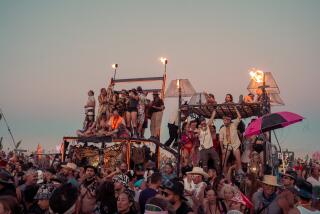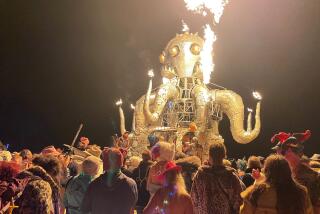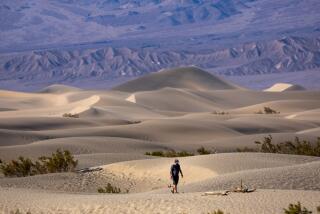Burning Man can be doable for people with disabilities
Burning Man, the counterculture project that draws 70,000 to Nevada’s Black Rock Desert each year, begins Aug. 25.
This nine-day celebration of experimental community and self-expression combines extreme camping with music, art, performance and partying.
Its climax is the ritual burning of a towering human effigy, a.k.a. the Man.
Among Burning Man’s 10 core principles is radical inclusion, meaning it aims to be open to all people (provided they have a ticket). This ethos attracts a growing number of people with disabilities from all over the world.
“I need Burning Man for that reminder that I am still a valid, whole human while I’m broken,” said Charis Hill, a chronic disease advocate, model and blogger who is preparing for her fourth Burn.
The event is described as life-changing but difficult because of the harsh desert conditions.
Picture dust storms that cause total white-outs, flash floods, scorching heat and the threat of dehydration. Picture no modern conveniences or the ability to buy things you may need.
Can people with disabilities really do this?
“I want to dispel that you can’t do Burning Man if you’re disabled,” said Dani Moore, 64, a veteran Burner who uses a wheelchair and runs the Mobility Camp. “Yes, you can. You just have to know how.”
Here is advice from Hill and Moore for first-time Burners, especially anyone with mobility challenges.
►Conditions in the Black Rock Desert, about 120 miles northeast of Reno, are unpredictable and inhospitable. Expect volatile weather, including high winds, dust storms and flash thunderstorms that will turn the hard alkali ground into mud. This means your mobility device will be grounded until things dry up.
“If it rains, you won’t be able to take your chair anywhere, not even the port-a-potty,” Moore said, so bring a 5-gallon bucket with a seal to use as a toilet just in case.
►The dust and harsh environment will wreak havoc on your equipment. If you have a spare chair or scooter, take it instead of your everyday mobility device. Read more about wheelchairs on the playa and what to expect in terms of access: bit.ly/gettingaroundBurningMan.
►Sound and light go on 24 hours a day at Burning Man. This will be an important factor for anyone with a sensory disability, such as autism spectrum disorder.
►Another principle of Burning Man is radical self-reliance. There are no caretakers. Bring everything you’ll need to set up camp and survive. Bring friends or a personal care assistant if you’ll need help with activities of daily living, setting up camp or navigating the event.
►Consider joining an established camp where more experienced Burners can show you the ropes. Mobility Camp still has openings, and the cost is $150; to register before spaces fill up: bit.ly/mobilitycamp.
“What happens a lot is people will camp with us for their first year, figure out what works for them and then go camp with friends,” Moore said.
Mobility Camp will lend wheelchairs, walkers, hand cycles, knee scooter and crutches to those who are injured during the Burn. It also runs a trailer towed by a 1941 tractor to take seniors, pregnant women, wheelchair users and anyone who has difficulty walking long distances to view art installations and performances.
“The city itself is approximately five miles across,” Moore said. “Most power mobility devices don’t have the range for that, most manual wheelchair users don’t have the muscle for that and some people due to age or whatever can’t get themselves across those distances.”
As we know in the world of disability, “inclusive” does not always mean accessible, so you’ll need to develop workarounds.
“People who are disabled adapt every day by necessity, so in a way that makes us better equipped to handle places like Burning Man,” said Hill, who has blogged about her Burning Man experiences.
She recommends bringing extra medication and putting a plan in place in case of emergency.
“You are literally going into extreme survival,” she said. “Not everyone is going to know how to help you if you have a disability.”
Connect with others beforehand and ask for advice. A camp called Da Dirty Hands, for people who are deaf and hard of hearing, has a Facebook page. Mobility Camp’s website is comprehensive, and Moore said the group is available to answer questions: mobilitycamp.org
More to Read
Sign up for The Wild
We’ll help you find the best places to hike, bike and run, as well as the perfect silent spots for meditation and yoga.
You may occasionally receive promotional content from the Los Angeles Times.






